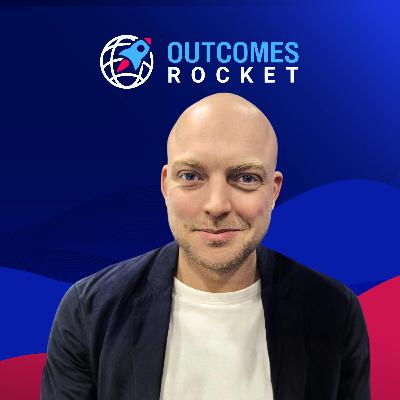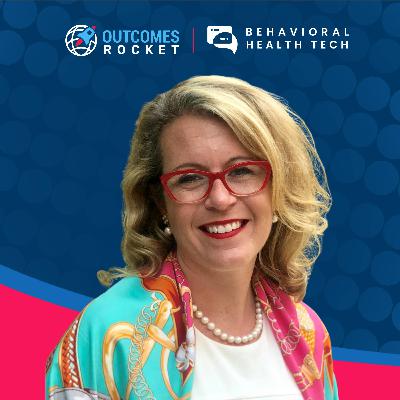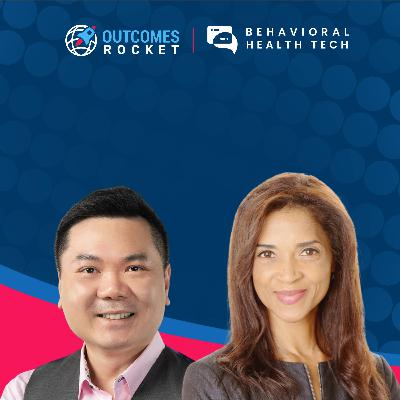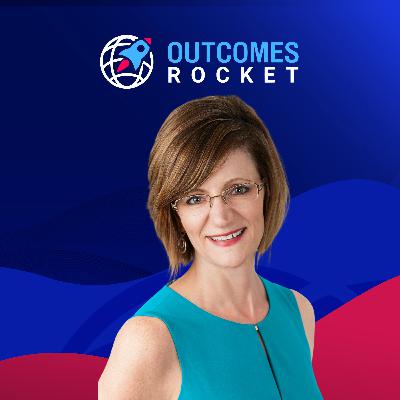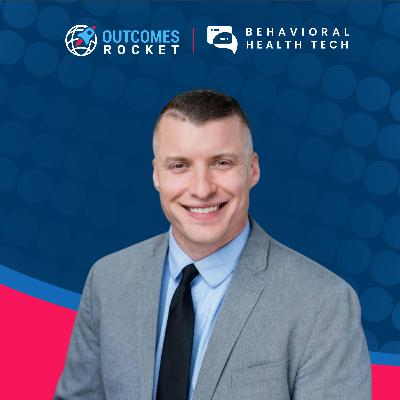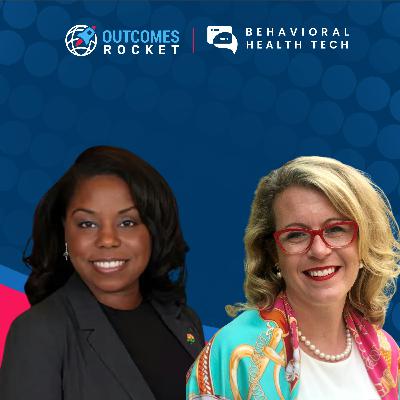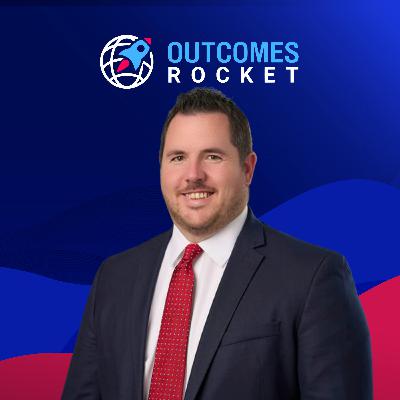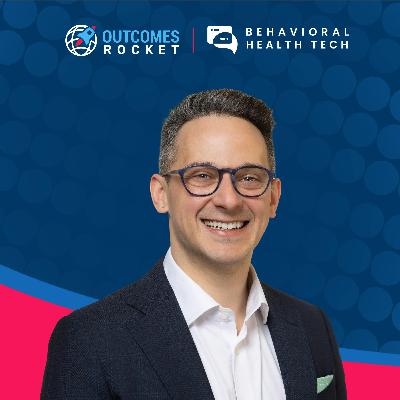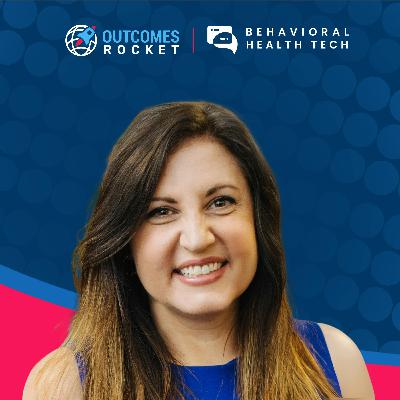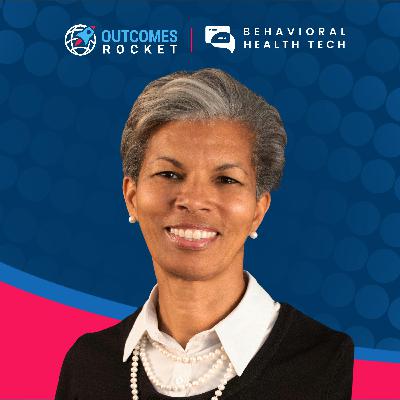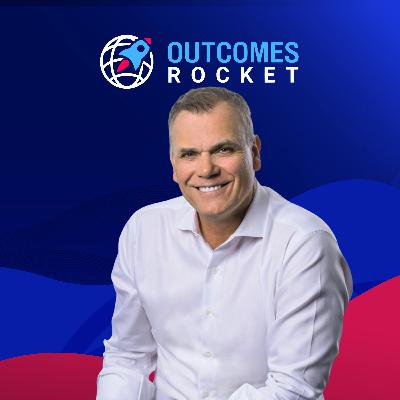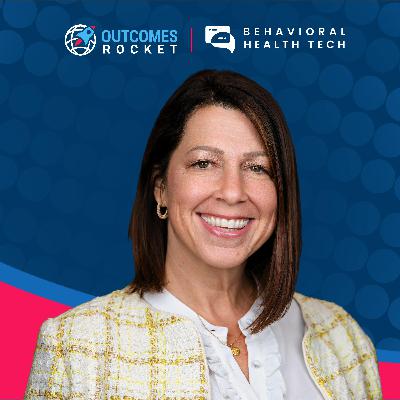Discover Outcomes Rocket
Outcomes Rocket

Outcomes Rocket
Author: Saul Marquez
Subscribed: 91Played: 12,625Subscribe
Share
© Saul Marquez
Description
At Outcomes Rocket, we are the shared knowledge hub for healthcare's toughest problems. Our goal is twofold and clear. To help inspire and guide our listeners to 1. Improve patient outcomes and 2. Experience business success in healthcare. Tune in to learn more!
2096 Episodes
Reverse
This podcast is brought to you by Outcomes Rocket, your exclusive healthcare marketing agency. Learn how to accelerate your growth by going to outcomesrocket.com
Early detection is the key to longevity, and proteomics may be the breakthrough that finally makes it possible.
In this episode, Matthew Bradley, Director of Marketing at Molecular You, shares how the company’s “pre-diagnostic” approach is redefining preventive healthcare. Instead of waiting for symptoms, their blood-based proteomic testing detects early biological changes that signal potential disease risk. By analyzing proteins rather than genes, Molecular You offers a real-time picture of a person’s health and lifestyle impact. Bradley also highlights how at-home testing and partnerships with functional and concierge medicine providers are making proactive, personalized care more accessible.
Tune in and learn how pre-diagnostic proteomics is reshaping longevity, empowering individuals to stay ahead of disease, and redefining what it means to live healthier for longer!
Resources
Connect with and follow Matthew Bradley on LinkedIn.
Follow Molecular You on LinkedIn and discover their website.
This podcast is brought to you by Outcomes Rocket, your exclusive healthcare marketing agency. Learn how to accelerate your growth by going to outcomesrocket.comThis podcast is brought to you by Outcomes Rocket, your exclusive healthcare marketing agency. Learn how to accelerate your growth by going to outcomesrocket.com
Scaling your business isn’t about hiring more people; it’s about rethinking what truly drives value.
In this episode, Simone Severino, founder of Strategy Sprints, shares how business owners can scale their operations effectively by simplifying processes and focusing on what clients genuinely need. He explains why founders should delegate repetitive work to AI and systems, allowing their teams to focus on high-impact tasks. Simone breaks down his “four-offer” model, which includes attraction, upsell, downsell, and continuity, helping companies increase sales velocity and lifetime value. He also highlights how mapping the customer journey reveals opportunities to remove friction and build products that truly serve.
Tune in to learn how to scale smarter, not harder!
Resources:
Connect with and follow Simone Severino on LinkedIn.
Follow Strategy Sprints on LinkedIn, discover their website, and check out their tools!
Pick up a copy of Simone Severino’s book, Strategy Sprints: 12 Ways to Accelerate Growth for an Agile Business, here!
The next decade of mental health innovation won’t be defined by who builds the best product, but by who anticipates the policy pathways that bring it to scale.
In this episode, Kacie Kelly, Chief Innovation Officer at Meadows Mental Health Policy Institute, explores how behavioral health startups can bridge the gap between early traction and national scalability by viewing policy as a strategic growth tool rather than merely a compliance requirement. She reflects on a recent Washington, DC, event that united over 60 tech and policy leaders to tackle barriers to scaling tech-enabled, measurement-informed care. The discussion spanned topics such as AI in mental health, workforce trust in technology, and the importance of constructive dialogue between innovators and policymakers. Kacie highlights that policy determines who pays for what, when, and how, urging founders to build reimbursement strategies early and leverage programs like HeadsUp to navigate policy landscapes and accelerate growth through federal initiatives.
Tune in and learn how policy foresight can become your most powerful innovation advantage!
Resources:
Connect with and follow Kacie Kelly on LinkedIn.
Follow the Meadows Mental Health Policy Institute on LinkedIn and visit their website.
Listen to Kacie Kelly and Talisha Searcy’s previous interview on our podcast here.
Learn more about the HeadsUp service here.
This podcast is brought to you by Outcomes Rocket, your exclusive healthcare marketing agency. Learn how to accelerate your growth by going to outcomesrocket.com
The shift to outpatient surgery is transforming how care is delivered.
In this episode, Dr. Adam Thaler, Medical Director at Summit Health, discusses leading a urology-focused ambulatory surgery center and the rapid growth of outpatient procedures. He explains why airway management is the cornerstone of patient safety in ASCs and why he relies on video laryngoscopy, particularly the McGrath MAC, for every case. Dr. Thaler highlights the clinical, financial, and operational benefits of this technology, including reduced complications, improved efficiency, and enhanced patient experience. He also shares advice for ASC leaders on embracing innovation, doing their own research, and treating every patient with the same high standard of care.
Tune in to hear how Dr. Thaler is shaping the future of outpatient surgery!
Resources:
Connect with and follow Dr. Adam Thaler on LinkedIn.
Follow Summit Health on LinkedIn and explore their website!
Check out Dr. Adam Thaler’s Medtronic blog on How the intubation tools you choose can affect your facility’s costs and more!
References:
Leifer S, Choi SW, AsanatiK, YentisSM. Upper limb disorders in anaesthetists-a survey of Association of Anaesthetistsmembers. Anaesthesia. 2019;74(3):285-291. doi:10.1111/anae.14446
Kriege M, Noppens R, TurkstraT, et al. A multicentrer randomized controlled trial of the McGrath MAC video laryngoscope versus conventional laryngoscopy. Anaesthesia. 2023;78(6):722-729.
Zhang J, Jiang W, Urdaneta F. Economic analysis of the use of video laryngoscopy versus direct laryngoscopy in the surgical setting. Journal of Comparative Effectiveness Research. 2021;10(10):831-844. doi:https://doi.org/10.2217/cer-2021-0068
Nørskov AK, Rosenstock CV, Wetterslev J, Astrup G, Afshari A, Lundstrøm LH. Diagnostic accuracy of anaesthesiologists’ prediction of difficult airway management in daily clinical practice: a cohort study of 188,064 patients registered in the Danish Anaesthesia Database. Anaesthesia. 2015;70(3):272-281.
Kleine-Brueggeney M, Greif R, Schoettker P, Savoldelli GL, Nabecker S, Theiler LG. Evaluation of six video laryngoscopes in 720 patients with a simulated difficult airway: a multicentre randomized controlled trial. Br J Anaesth. 2016;116(5):670-9.
Thaler A, Mohamod D, Toron A, Torjman MC. Cost comparison of 2 video laryngoscopes in a large academic center. Journal of Clinical Outcomes Management. 2021 July;28(4):174-179.
Moucharite MA, et al. Factors and economic outcomes associated with documented difficult intubation in the United States. Clinicoecon Outcomes Res. 2021;13:227–239.
Gaszyński T. Comparison of the glottic view during video-intubation in super obese patients: a series of cases. Ther Clin Risk Manag. 2016;12:1677–1682.
Alvis BD, Hester D, Watson D, Higgins M, St Jacques P. Randomized controlled trial comparing the McGRATH™ MAC video laryngoscope with the King Vision video laryngoscope in adult patients. Minerva Anestesiol. 2016;82(1):30–35.
Disclaimer: Unless cited, the contents and conclusions of the following presentation are solely those of the author. The author received funding from Covidien LP, a Medtronic company, for this speaking engagement. The author is responsible for all content and any necessary permissions.
For trained personnel only. For specific indications and instructions for use, please refer to the product manual.©2025 Medtronic. Medtronic, Medtronic logo, and Engineering the extraordinary are trademarks of Medtronic. All other brands are trademarks of a Medtronic company. 10/2025 – US-RE-2500145
In a world where life feels more complex than ever, simplicity might just be the key to better care.
In this episode, Dr. Matthew Chow, Chief Mental Health Officer, and Paula Allen, Global Leader and VP of Research, Insights, and Strategic Communications at TELUS Health, discuss how organizations can make employee well-being simpler, more personal, and more effective. They explore the global shift from crisis response to prevention and how empowered, compassionate leadership directly drives both mental health and business performance. Together, they emphasize the importance of culturally responsive, locally delivered care and measurable impact, reminding us that beyond ROI, well-being initiatives ultimately save lives.
Tune in to learn how simplifying care can strengthen connection, resilience, and results!
Resources:
Connect with and follow Dr. Matthew Chow on LinkedIn.
Connect with and follow Paula Allen on LinkedIn.
Follow TELUS Health on LinkedIn and explore their website.
AI in behavioral health demands a balanced strategy that protects consumers, enables innovation, and expands access at scale.
In this episode, Dr. Zach Boyd, Director of Utah’s Office of Artificial Intelligence Policy, shares how his team is creating practical guardrails for responsible AI in healthcare. He traces his path from theoretical math to social science, noting that behavioral health is the front line for AI’s impact. Early milestones include broad stakeholder surveys, privacy and advertising protections, detailed guidance for professionals, and a safe harbor to reduce regulatory uncertainty. Dr. Boyd highlights opportunities in clinical automation and consumer tools, while warning about risks like deepfakes and urging leaders to balance safety, efficacy, and access.
Tune in and learn how thoughtful policy can accelerate safer, more equitable behavioral health innovation!
Resources:
Connect with and follow Dr. Zach Boyd on LinkedIn.
Learn more about Utah’s Office of Artificial Intelligence Policy here.
Email Utah’s Office of Artificial Intelligence Policy directly here.
This podcast is brought to you by Outcomes Rocket, your exclusive healthcare marketing agency. Learn how to accelerate your growth by going to outcomesrocket.com
Bullying and incivility don’t just harm team morale; they threaten patient care and drive great people away.
In this episode, Dr. Renee Thompson, CEO and Founder of the Healthy Workforce Institute, discusses how healthcare leaders can address bullying and incivility to foster healthier workplace cultures. She shares insights from the newly released second edition of her Amazon best-selling book, Enough! Eradicate Bullying and Incivility in Healthcare, updated to reflect the challenges of a post-COVID workforce. Dr. Thompson explains how her own leadership struggles inspired her to create practical tools that help others set behavioral expectations and address disruptive behaviors with confidence. She also discusses her Coffee Break podcast, where she chats with leaders who are driving real change in workplace culture across industries.
Tune in to learn how you can take meaningful action to stop bullying and foster a culture of respect and safety!
Resources:
Connect with and follow Dr. Renee Thompson on LinkedIn.
Follow the Healthy Workforce Institute on LinkedIn and discover their website!
Get a copy of Dr. Renee Thompson’s book, Enough! Eradicate Bullying and Incivility in Healthcare: Strategies for Front Line Leaders, here!
Check out the Coffee Break podcast here!
The future of mental health care lies in integrating self-care, personalization, and technology to meet people where they are.
In this episode, Clayton Nicholas, Chief Commercial Officer at CredibleMind, discusses the urgent need to reimagine the intersection of mental and physical healthcare by focusing on prevention, accessibility, and personalization. He explains that the traditional, reactive, and clinician-limited model has left millions underserved and introduces the stepped care approach, where digital self-care tools form a foundational “step zero.” Clayton describes how digital front doors can simplify access, reduce stigma, and guide people toward the right level of support, helping to shorten waitlists and ease pressure on the system. He concludes by highlighting how data-driven insights and AI can personalize care, strengthen empathy and engagement, and enable earlier, more effective interventions at scale.
Tune in and learn how digital innovation is reshaping behavioral health by bridging access gaps and empowering self-care from the ground up!
Resources:
Connect with and follow Clayton Nicholas on LinkedIn.
Follow CredibleMind on LinkedIn and explore their website.
Normalizing mental health support is essential to expanding access for veterans and their families.
In this episode, John Boerstler, Head of Public Sector at Ipsos Public Affairs, discusses the unique challenges veterans face in accessing behavioral health support and the critical need to reduce the stigma surrounding care-seeking. Drawing on his own military service and career across government, nonprofit, and private sectors, he emphasizes how cultural competency, community engagement, and innovative program design can strengthen pathways to care. He highlights initiatives such as National Buddy Check Week, proactive crisis-detection systems, and partnerships that connect veterans to vital services, including housing, employment, and legal aid. He also notes survey data showing that many veterans wait until crisis points to seek help. Finally, John reflects on how technology, combined with human-centered strategies and continuous veteran input, can help identify early warning signs, empower providers, and ensure that no veteran is left behind.
Tune in and learn how innovation, empathy, and collaboration can transform veteran behavioral health care!
Resources:
Connect with and follow John Boerstler on LinkedIn.
Follow Ipsos in the US on LinkedIn and explore their website.
Learn more about the Office of Healthcare Innovation and Learning on their website.
The warm handoff model in behavioral health has proven to dramatically increase patient retention and improve access to care in rural communities.
In this episode, Dr. Zachary McGeorge, Director of Behavioral Health at AdventHealth in Manchester, Kentucky, shares his journey into social work and the unique challenges rural hospitals face. He highlights transportation barriers and innovative strategies such as telehealth outpost clinics, mobile units that deliver care to patients’ homes, and a warm handoff approach that has driven an 88% therapy retention rate. Dr. McGeorge addresses the difficulty of recruiting and retaining providers in rural areas, stressing persistence, authenticity, and a deep emotional connection to the mission. He also talks about the value of integrated care, provider well-being, and balanced living, along with practical advice for emerging leaders on managing change and engaging stakeholders throughout reforms.
Tune in and learn how rural healthcare leaders are innovating to close gaps in behavioral health access and build stronger, more resilient communities!
Resources:
Connect with and follow Dr. Zachary McGeorge on LinkedIn.
Follow AdventHealth on LinkedIn and explore their website.
This podcast is brought to you by Outcomes Rocket, your exclusive healthcare marketing agency. Learn how to accelerate your growth by going to outcomesrocket.com
Solving big healthcare problems isn’t enough. You need to fit solutions into budgets and build the right partnerships.
In this episode, Dr. Ido Zamberg, Co-founder and Chief Medical Officer at C8 Health, shares his journey from software engineering to medicine and how he combined both disciplines to transform healthcare delivery. Confronted with the challenge of accessing institutional knowledge as a physician, he built a platform that consolidates best practices, protocols, and operational data into one accurate, actionable system. Now used in more than 100 hospitals, the platform improves clinician efficiency, enhances patient outcomes, and enables collaboration across departments and health systems. Dr. Zamberg reflects on lessons learned, stressing the importance of navigating budgets creatively, finding champions to drive adoption, and encouraging leaders to partner with startups that specialize in solving these complex problems.
Tune in and learn how innovation, persistence, and partnership can redefine care at every level of the health system!
Resources:
- Connect with and follow Dr. Ido Zamberg on LinkedIn.
- Learn more about C8 Health on their LinkedIn and website.
Behavioral health was left out of the digital revolution in healthcare; now a $20 million federal initiative is changing that story.
In this episode, Talisha Searcy, Senior Advisor within the Assistant Secretary for Technology Policy, and Kacie Kelly, Chief Innovation Officer at the Meadows Mental Health Policy Institute, discuss the Behavioral Health Information Technology Initiative. Talisha explained that BHIT is a $20 million partnership between ASTP and SAMHSA focused on standardizing behavioral health data, advancing EHR adoption, and improving integration with physical health. Kacie highlighted that behavioral health was left out of the HITECH Act, creating long-standing gaps in infrastructure, funding, and data standards that BHIT now aims to address. Talisha emphasized the importance of interoperability and the USCDI+ for behavioral health, with pilots testing real-world data exchange and toolkits to help providers adopt these standards. Both emphasized the importance of collaboration across federal agencies to ensure alignment, as well as opportunities for innovators and the private sector to engage in shaping policies, particularly in areas such as interoperability and AI. Locally, Talisha noted how technology like telehealth is already improving access and care coordination in communities, despite workforce shortages.
Tune in to hear from national leaders on how BHIT is setting new standards, driving innovation, and opening doors for providers and innovators in the behavioral health field!
Resources:
Connect with and follow Talisha Searcy on LinkedIn.
Follow the Assistant Secretary for Technology Policy on LinkedIn and visit their website.
Connect with and follow Kacie Kelly on LinkedIn.
Follow the Meadows Mental Health Policy Institute on LinkedIn and visit their website.
Learn more about the HeadsUp service here.
This podcast is brought to you by Outcomes Rocket, your exclusive healthcare marketing agency. Learn how to accelerate your growth by going to outcomesrocket.com
Aligning provider buy-in, leadership priorities, and patient-centered strategies is key to closing the ACO engagement gap.
In this episode, Dr. Lauren Fore, Chief Medical Officer at IRCCO, shares how provider engagement is key to motivating patients to follow through with preventive care and wellness visits. Todd Searls, Executive Director of IRCCO ACO, underscores the role of leadership in setting priorities, addressing burnout, and supporting care teams to sustain patient engagement. Kathryn Anderton, Vice President of Clinical Services at ThoroughCare, highlights the importance of care management, motivational interviewing, and trust-building through consistent monthly touchpoints. Together, they discuss the unique challenges of rural communities, the power of partnerships, and the value of combining digital tools with human connection for sustainable outcomes.
Tune in and learn how thoughtful provider engagement, leadership support, and innovative partnerships can close the engagement gap and transform ACO success!
Resources:
Connect with and follow Dr. Lauren Fore on LinkedIn.
Follow and connect with Todd Searls on LinkedIn.
Learn more about IRCCO on their LinkedIn and website.
Connect with and follow Kathryn Anderton on LinkedIn.
- Discover more about ThoroughCare on their LinkedIn and explore their website.
The strongest organizations aren’t just scaling services; they’re scaling leadership.
In this episode, Stacy DiStefano, CEO and founder of Consulting For Human Services, discusses the unique challenges and opportunities facing nonprofit behavioral health organizations. She explains how her team supports providers with strategic planning, growth strategies, technology adoption, and mergers & acquisitions (M&A) to ensure sustainability, while highlighting why boutique consultancies often deliver more value than large firms through lived experience and community ties. Stacy also explores the real issues keeping leaders up at night, from immigration policies impacting workforce stability to uncertainty in federal priorities and the accelerating wave of nonprofit consolidations, while outlining common pitfalls in M&A such as ego, resistance, and board misalignment. Looking ahead, she stresses the need for CEOs to educate boards, prepare the next generation of leaders, integrate technology across organizations, and embrace disruption as an opportunity rather than a threat.
Tune in and learn how nonprofit leaders can future-proof their organizations through resilience, growth, and mission-driven strategy!
Resources:
Connect with and follow Stacy DiStefano on LinkedIn.
Follow Consulting For Human Services on LinkedIn and explore their website.
Summary:
The healthcare industry is resilient, and even in times of financial pressure and policy uncertainty, new opportunities for growth and innovation emerge.
In this episode, Dan Czech, VP of Insights at KLAS Research, shares findings from a survey of 169 healthcare delivery organizations (HDOs) on how they are adapting to federal policy shifts and the “Big Beautiful Bill.” Many HDOs report they have yet to recover to pre-COVID margins, with narrow margins, staffing shortages, and rising costs compounded by the uncertainty of rapidly changing regulations. Lacking clear direction, organizations are acting now with multiple contingency strategies, workforce adjustments, and careful protection of patient-facing roles. Despite financial strain, IT and AI remain top investment priorities to offset workforce reductions and reduce clinician burnout, though many remain stuck in pilot programs. Dan notes that providers are reevaluating payer contracts, rural systems are leaning on federal programs, and the industry’s resilience points to long-term progress.
Tune in and learn how organizations are adapting to change and preparing for the future!
Resources:
Connect with and follow Dan Czech on LinkedIn.
Follow KLAS Research on LinkedIn and visit their website!
Read the Navigating the Uncertainty of Federal Policy 2025 Report here.
Email Dan directly here.
The pain of youth must always be seen alongside its power.
In this episode, Rich Havard, Director of the Decolonizing Wealth Project’s Youth Mental Health Fund, shares his journey from a closeted gay kid in rural Mississippi to leading a $20 million initiative supporting BIPOC and LGBTQ youth. He reflects on formative church experiences, both healing and harmful, that shaped his commitment to creating inclusive spaces, as well as his years as a pastor witnessing the struggles and resilience of young people. Rich underscores the urgent need for philanthropy to fund culturally responsive care and elevate youth voices as true decision-makers shaping solutions. Ultimately, he reframes youth mental health as an issue of both justice and connection.
Tune in and learn how integrating culture, storytelling, and justice can transform youth mental healthcare!
Resources:
Connect with and follow Rich Havard on LinkedIn.
Follow the Decolonizing Wealth Project on their LinkedIn and Instagram, and explore their website.
Learn more about the Youth Mental Health Fund here.
Contact the Decolonizing Wealth Project team here.
Read Decolonizing Wealth Project CEO and Founder, Edgar Villanueva's book, Decolonizing Wealth, here.
Discover more about Dr. Alfiee’s The AAKOMA Project here.
Having the right tools in place the first time can make all the difference for patients and families navigating behavioral health.
In this episode, Janelle Bierdeman, a nationally certified school psychologist and the Manager of the Healthcare Solutions Group at MHS (Multi-Health Systems), shares her journey from direct care with children and families to driving systems-level transformation in behavioral health. She reflects on the risks of poor assessments, outdated systems, and the importance of rigorous tools to ensure providers deliver the right care from the start. Drawing on her perspective as both a professional and a parent of neurodivergent children, Janelle emphasizes the need for tailored assessments, clinician involvement in digital tools, and cross-cultural insights from North America and Europe. She also highlights a UK success story scaling patient assessments from 25 to 2,500 per month, and sees AI as a powerful way to reduce administrative burdens and free providers to spend more time with patients.
Tune in and learn how technology, when done right, can truly expand access to quality behavioral health care!
Resources:
Connect with and follow Janelle Bierdeman on LinkedIn.
Follow MHS on LinkedIn and explore their website.
This podcast is brought to you by Outcomes Rocket, your exclusive healthcare marketing agency. Learn how to accelerate your growth by going to outcomesrocket.com
Far too many women veterans are overlooked, leading to gaps in care, resources, and recognition.
In this episode brought to you by Luminary Labs, Wanda Wright, Director of the Office for Veteran and Military Academic Engagement at Arizona State University, shares her mission to advocate for women veterans and improve access to resources. She explains that many women do not recognize themselves as veterans, which, combined with cultural bias and lack of awareness, leads to higher rates of suicide and homelessness compared to men. Director Wright highlights the importance of asking “Have you served?” in healthcare settings and stresses that collaboration among the VA, state agencies, nonprofits, and local groups is essential to provide effective support, especially in rural areas. While progress has been made with more women joining the military and rising to leadership, she emphasizes that continued advocacy and community involvement are crucial to breaking down barriers and saving lives.
Tune in as Wanda Wright shares her powerful journey and insights on breaking barriers, advocating for women veterans, and building stronger systems of support!
Resources:
Connect with and follow Wanda Wright on LinkedIn.
Follow the Arizona State University on LinkedIn and visit their Office for Veteran and Military Academic Engagement website.
Check out Wanda Wright’s paper, The Social Determinants of Suicide among Female Service Members and Veterans: Running Title: Social Determinants of Suicide, here.
This podcast is brought to you by Outcomes Rocket, your exclusive healthcare marketing agency. Learn how to accelerate your growth by going to outcomesrocket.com
Peace of mind in healthcare is just as important as access to care itself.
In this episode, Dr. David Berg, Founder and CEO of Redirect Health, contrasts his experiences with Canadian and U.S. healthcare, noting that while America offers world-class medical care, it often leaves patients without confidence or peace of mind. He explains that uncertainty about affordability and access creates anxiety long before patients enter the system. Redirect Health addresses this by offering a free entry point into care through technology, virtual access, and advocacy, while focusing on logistics, how, and where care is delivered, as the key to lowering costs. David stresses that the U.S. doesn’t lack funding; it must redirect resources toward delivering real value and peace of mind.
Tune in and learn how healthcare logistics and advocacy can transform both cost and access!
Resources:
Connect with and follow Dr. David Berg on LinkedIn.
Follow Redirect Health on LinkedIn and visit their website!
Listen to David’s previous interview on our podcast here!
Email David directly here.
This podcast is brought to you by Outcomes Rocket, your exclusive healthcare marketing agency. Learn how to accelerate your growth by going to outcomesrocket.com
Strong science isn’t just a checkbox; it’s a growth strategy that can set digital health startups apart in crowded markets.
In this episode, Dr. Jennifer Huberty, CEO & founder of Fit Minded, explores how behavioral health companies at any stage can build scientific credibility without depleting their resources. She stresses that many startups fail to recognize the value of the data they already possess: data that can drive business decisions, fuel marketing narratives, and even lead to peer-reviewed publications. Jennifer walks through cost-effective research strategies, such as retrospective analyses and national surveys, while cautioning against fragmented, one-off studies that lack strategic alignment. She also introduces the idea of “traveling science,” a framework for making research actionable across departments, and emphasizes that trust, transparency, and clear alignment with business goals are essential for impactful, lasting research partnerships.
Tune in and learn how to leverage research not just for credibility, but for growth, clarity, and competitive advantage in the behavioral health tech landscape!
Resources:
Connect with and follow Dr. Jennifer Huberty on LinkedIn.
Follow Fit Minded on LinkedIn and explore their website.


